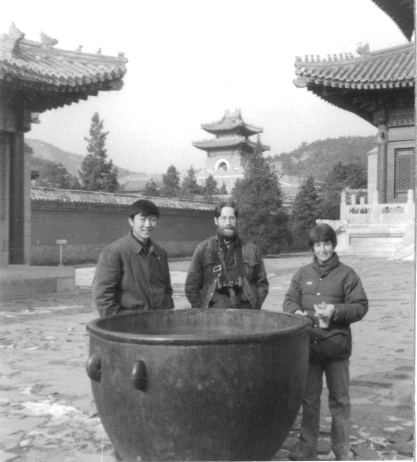[under construction]
‘Sean Golden’ in Chinese
華夏 Huáxià – Cathay (契丹 Qìdān) – 中土 Zhōngtu
新华 Xīnhuá – New China
‘Sean Golden’ in Chinese
Sean Golden –> 肖恩.戈尔登 Xiào’ēn Gē’ěrdēng (official police transliteration).
“Golden” –> 戈尒登 Gē’ěrdēng (standard police name on documentation).
戈尒登 Gē’ěrdēng is a phonetic transliteration; it has no meaning in Chinese. In Chinese, 戈 gē means an ancient Chinese weapon (dagger-axe, halberd) and is originally a pictogram of a battle axe; 尒 ěr is a grammatical connector; 登 dēng means to ascend, climb or mount, and is originally a pictogram of two feet ascending a pedestal.
Because 戈 gē is a weapon, Chinese colleagues preferred 高尔登 Gāo’ěrdēng (高 gāo means ‘high, tall, etc.’, giving rise to the punning translation ‘high and still flying’).
In an article published in 1982, 王佐良 Wáng Zuǒliáng quoted comments I made at a James Joyce Symposium in Dublin that year, transliterating me as 旭恩·哥尔登 Xù’ēn Gē’ěrdēng, still another version (哥 gē means ‘elder brother’).
Because these purely phonetic transliterations sounded obviously foreign in Chinese, some writer friends proposed transliterations that could sound like authentically Chinese names.
The poet 芒克 Máng Kè (a transliteration of Arthur Waley’s title Monkey for his translation of the classic 西游記 Xīyóu Jì [Journey to the West]) proposed 高盾 Gāo Dùn (‘high’ or ‘strong’ ‘shield’, because I helped dissident poets by participating in their translation into English and getting them international recognition by being published outside of China; 芒克 Máng Kè is the pseudonym of 姜世伟 Jiāng Shìwěi).
The poet 杨炼 Yáng Liàn disliked the use of 盾 dùn ‘shield’ because it is also a weapon, and proposed 高遁 Gāo Dùn (‘high’ ‘escape’, same pronunciation as 高盾 Gāo Dùn) because it alludes to the 成語 chéngyǔ (set phrase) 遁入空門 dùnrùkōngmén ‘escape through (遁入 dùnrù) the gate of emptiness (空門 kōngmén)’, meaning ‘to become a monk’.
‘Golden’ taught literature in English for Chinese students and writers and translated “Mang Ke” and “Yang Lian” (and others) into English.
“Golden” –> 戈尒登 –> 高尔登 –> 高盾 –> 高遁 –> a personal experience of being ‘the Other’; a form of Orientalisation.
Cathay

Eastern Tombs 1981-1982
Chinese Text Project
成語 Chéngyu 成语
Chinese Idioms – Chengyu
Search for Chinese idioms
Theme Idioms
New China

天津外国语语言学院 1981-1982
New China Newspeak 新华文体 – Geremie R. Barmé
China Blog Sites
China Media Project. A Project of the Journalism and Media Studies Centre at the University of Hong Kong
Decoding China The Decoding China Dictionary
The CMP Dictionary Archive
Europe-China Cultural Compass: An Orientation for Cultural Cooperation between Europe and China